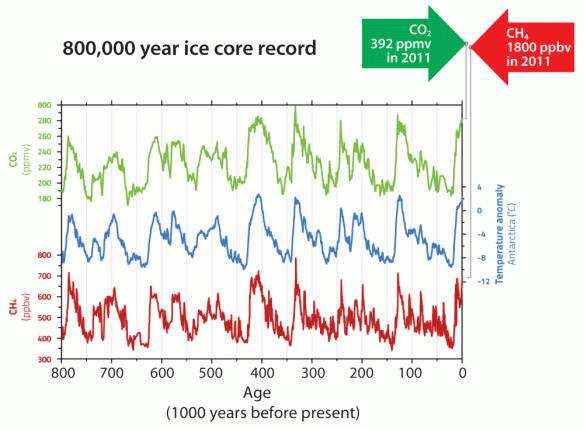“In the face of an absolutely unprecedented emergency, society has no choice but to take dramatic action to avert a collapse of civilization.”
This incredible quote is from Environment and Development Challenges: The Imperative to Act, a report from laureates of the Asahi Blue Planet Prize, published 20 February. It sounds like the climax of a Hollywood disaster movie.
Is there enough evidence to back such a statement? Authors of the report, who include NASA’s James Hansen, and also Susan Solomon, Paul Ehrlich, Hal Mooney and Bob Watson, the chief scientific advisor to the UK’s environment ministry, DEFRA, think so.
Below are links to 19 published peer-reviewed research papers that may explain why many scientists are so concerned.

- Global warming preceded by increasing carbon dioxide concentrations during the last deglaciation (2012, Nature)
- Past extreme warming events linked to massive carbon release from thawing permafrost (2012, Nature)
- The geological record of ocean acidification (2012, Science)
- Determining the natural length of the current interglacial (2012, Nature Geoscience)
- Climate sensitivity in the Anthropocene (2011, Earth System Dynamics)
- Abrupt onset of the Little Ice Age triggered by volcanism and sustained by sea-ice/ocean feedbacks (2011, Geophysical Research Letters)
- Sea-level rise and its possible impacts given a ‘beyond 4°C world’ in the twenty-first century (2011, Philosophical Transactions of the Royal Society A)
- Four degrees and beyond: the potential for a global temperature increase of four degrees and its implications (2011, Philosophical Transactions of the Royal Society A)
- Early-warning signals for critical transitions (2009, Nature)
- September sea-ice cover in the Arctic Ocean projected to vanish by 2100 (2009, Nature Geoscience)
- Antarctic temperature and global sea level closely coupled over the past five glacial cycles (2009, Nature Geoscience)
- High-resolution carbon dioxide concentration record 650,000–800,000 years before present (2008, Nature)
- Orbital and millennial-scale features of atmospheric CH4 over the past 800,000 years (2008, Nature)
- Tipping elements in the Earth’s climate system (2007, PNAS)
- How fast are the ice sheets melting? (2006, Science)
- Global consequences of land use (2005, Science)
- Abrupt climate change (2003, Science)
- Catastrophic shifts in ecosystems (2001, Nature)
- Acceleration of global warming due to carbon-cycle feedbacks in a coupled climate model (2000, Nature)
Feel free to suggest other papers.

Environment and Development Challenges: The Imperative to Act, reads like a political manifesto. I want to see the science not a bunch a hairy faerie social equity BS. Scientists should stick to science and leave the politics to the lawyers.
Paul Ehrlic?? hasn’t he been fired or put out to pasture yet?’ “I can’t think of another scientist that has been more wrong, all of his “scenarios/predictions were spectacularly wrong. Not only was he wrong about the future all of his solutions were also wrong and if we would have followed his advice in the 70’s, Millions would have died. I repeat, Millions of real people (not hypothetical computer modeled people) would have died.
Hi, i think that i saw you visited my web site thus i got
here to go back the choose?.I am attempting to to find things to enhance my website!I guess its adequate to
use a few of your ideas!!